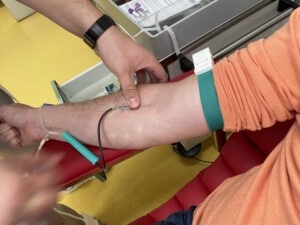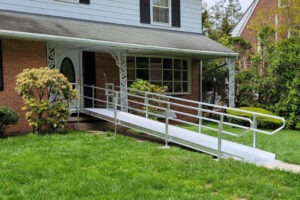
Saranika Griffith has known for several years that ambulance service agencies weren’t as prepared as they could be to handle emergency calls for kids with special needs.
Saranika knows because she’s an EMT with Lancaster EMS and has seen how kids with autism, for example, respond to the noise of the siren, and the glare of the lights on top of and inside the vehicle. She is particularly aware of how those kids respond because her 5-year-old son Tyler is autistic.
“In those situations, kids can be so overstimulated and they aren’t able to say what’s upsetting them,” said Sara, who commutes to work from her home in Lebanon. “And in too many cases an EMS Provider might not know how to calm them down.”
She decided to push for change.
That push produced a new partnership between Lancaster EMS and the Schreiber Center for Pediatric Development to provide 125 fully equipped sensory bags. With Schreiber’s help, Lancaster EMS will have sensory bags readily available on 30 frontline ambulances. These EMS providers can use sensory bags on calls involving children with autism or other behavioral or anxiety issues.
Marisa Seubert, marketing and development coordinator at Lancaster EMS, brought Griffith’s idea to Schreiber over the summer. Schreiber applied for and received a $5,000 grant from the Clark Family Foundation that paid for the bags and the supply of sensory items, including headphones, stress balls, and sensory necklaces.
Angie Rice, Schreiber’s director of therapy services, guided the project on Schreiber’s end.
“I loved the idea,” Angie said. “Anybody in the community should be aware of helping these kids when they are in a challenging (emergency) situation. There’s a lot of discussion right now on de-escalation techniques, where a police officer or an EMS provider encounters someone who is angry or upset, and you learn how to bring them back to a more rational state of mind. This hopefully will help avoid having a
bad outcome for one of these calls.”
Katie Miller-Amick, a community paramedic for Lancaster EMS, provided input on the project because she also has a child with special needs.
“It’s a really good tool for us to have,” said Katie, of West Donegal Township. “It might not be an everyday situation, but when it does happen it’s important for us to respond in a way that creates a positive experience for those patients.”
The bags and sensory items were ordered in October. The fully equipped bags are expected to be available on frontline ambulances – the vehicles will be marked with a special Sensory Prepared decal – by Dec. 1. Angie will do an in-person training Friday, Nov. 13, that will be recorded and made available for all Lancaster EMS staff.
“Schreiber wants people to know the needs these kids have so that they can be OK in any situation,” Angie said. “It’s another piece of the work we do to help families.”
Sara said she was grateful to see the project come together.
“I honestly am at a loss for words,” she said. “I’m overwhelmed. I’ve spent many years having this near and dear to my heart. To see my company take such an interest in what I feel so strongly about… I’m so thankful.”
The Schreiber Center for Pediatric Development is a nonprofit organization serving central Pennsylvania that offers the finest in innovative therapy, education, and recreation resources for children, teens, and young adults. For more information, please visit www.schreiberpediatric.org.
Lancaster EMS is a nonprofit public safety organization that provides primary 9-1-1 emergency and non-emergency medical services to 21 municipalities in Lancaster County. The Lancaster EMS mission is to provide comprehensive, skillful, and cost-effective emergency and non-emergency healthcare services to the Lancaster community while continuing to evolve with the changing healthcare needs. Lancaster EMS is the only Nationally Accredited Ambulance Service provider in Lancaster County. For more information, please visit www.lemsa.com.





































